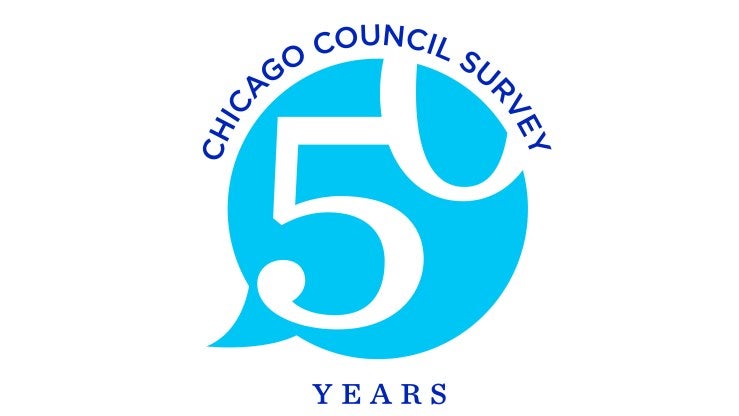The US public is now equally split on whether Israel’s war against Hamas in Gaza is justified or not.
Over the weekend, Israel and Hezbollah exchanged heavy fire in one of the largest cross-border clashes since the 2006 Israel-Hezbollah War. Israel launched a preemptive strike on Lebanon after receiving intelligence that showed Hezbollah was preparing to launch a major attack in retaliation for Israel’s assassination of its top military commander, Fuad Shukr. The world is still holding its breath in anticipation of Iran’s response to Israel’s alleged assassination of Hamas’ political leader and chief ceasefire negotiator, Ismail Haniyeh, in Tehran.
Data from the 2024 Chicago Council Survey, fielded June 21–July 1, 2024, and from a Chicago Council-Ipsos poll fielded August 9–11, 2024, show that Americans have grown more threatened by the possibility of a wider regional war in the Middle East. In addition to inflaming emotions across the Middle East, the conflict has also accentuated partisan divisions in support for Israel and opinions on whether or not a Palestinian state is part of the solution.
Key Findings
- A slight majority of Americans say the potential escalation of the war in Gaza into a wider war in the Middle East poses a critical threat to the United States (52%), up from 41 percent in June polling.
- An identical percentage thinks Iran’s support and funding for militant groups in the region is a critical threat (52%).
- Americans consider Hamas’s October 7 attack on Israelis an act of terrorism (72%) that was not justified (67%).
- When asked about Israel’s continuing war in Gaza, the US public is split on whether the military action is justified (32%) or not (34%; 33% unsure)
- Many believe Israel is intentionally targeting all Palestinians, including civilians (46%) as well as Hamas military leaders (71%).
- By a ratio of 5 to 4, Americans favor the establishment of an independent Palestinian state in the West Bank and Gaza Strip (49%; 41% oppose), consistent with opinions since 2018.
Americans Sense Several Threats to US Security Emanating from the Mideast
Half of the general public (51%) say they are following the conflict between Israel and Hamas somewhat (35%) or very (16%) closely, with all partisans tuning in at similar levels.
Since the recent assassinations of Ismail Haniyeh and Fuad Shukr, Americans have grown more threatened by the potential for the conflict in Gaza to escalate into a wider war in the Middle East. Now, 52 percent of Americans say an escalation poses a critical threat to the United States, up from 41 percent earlier this summer. An additional 39 percent say it poses an important but not critical threat. Those who are following the conflict very closely are even more likely to characterize the potential for a wider Mideast war as a critical threat (68%) (see appendix table 1).
Half also consider Iranian support for and funding of militant groups across the Middle East, like Hezbollah and Hamas, a critical threat to vital US interests in the next 10 years (52%). Four in 10 (39%) consider such to be an important but not critical threat.
There are only slight partisan differences on these potential threats. More than half of Republicans (58%) and Democrats (54%) and slightly fewer Independents (49%) consider the potential for a regional war in the Middle East a critical threat to vital US interests. When it comes to Iran’s support for various groups across the Middle East, there are wider partisan differences: Republicans are roughly 10 percentage points more likely than other partisans to consider it to be a critical threat to the United States (68% Republican, 47% Independent, 45% Democrat).
United States Seen as Playing More Positive Role in Mideast than Regional Actors
The war in Gaza has reverberated across the Middle East, pulling some of Israel’s closest neighbors into the fold. Americans tend to see Middle Eastern countries as playing a negative role in resolving key challenges in the region, while seeing the United States as playing the most positive one.
Eight in 10 Americans say Hamas (84%) and Iran (81%, up from 77% in 2015) play a negative role in the issues facing the Middle East. Majorities also say Saudi Arabia (58%, up from 54%), Qatar (56%), and Israel (54%, up from 46%) play a negative role in the region. When it comes to Egypt’s regional role, Americans are more divided (47% negative, 44% positive). By contrast, six in 10 Americans say the United States plays a positive role (61%, down from 69% in 2015), while only a third (33%) say it plays a negative role.1
Those who are very closely following news about the conflict are more likely to express positive views of Egypt’s role (58% positive, 40% negative) and are more divided on the role that Saudi Arabia plays (47% positive, 49% negative) (see appendix table 2).
Majority of Americans Consider October 7 Hamas Attack Terrorism
When asked their opinions about the current Israel-Gaza war in particular, significant percentages of Americans say they are unsure of their views, ranging from 22 percent to 44 percent unsure, consistent with other polling. These unsure views could reflect a number of variables, including limited knowledge about the conflict, the majority view that the United States should not take a side in the conflict, or the finding that Americans feel they need to be extra careful when discussing this issue.
Yet relatively few Americans express doubt about the nature of Hamas’ October 7 attack on Israel that resulted in about 1,200 Israelis dead. Seven in 10 consider it an act of terrorism (72%; 5% not terrorism, 22% not sure), and two-thirds think Hamas’s actions that day were unjustifiable (67%, 3% justified, 28% not sure). Solid majorities across political stripes condemn the October 7 brutality.
Americans about Equally Split on Whether Israeli Military Action Justified or Not
At the same time, Israel’s war in Gaza has resulted in a death toll of more than 40,000 Palestinian civilians, according to Gaza’s Ministry of Health. Americans are equally divided on whether the continuing Israeli military action in Gaza is justified (32%) or not (34%), yet another third (33%) is unsure. There has been a subtle shift in American attitudes on this question since March, with slightly fewer saying they are unsure (32%, down from 40% in March), and slightly more saying that the Israeli military action is justified (33%, up from 27% in March).
A majority of Republicans believe Israel is defending its interests and the military action is justified (58%, up from 53% in March), while the prevailing view among Democrats is that it has gone too far and is not justified (50%, 51% in March). Independents have grown less likely to say they are unsure (36%, down from 45% in March) and slightly more likely to say that Israel is justified (27%, up from 22% in March) (see appendix figure 1).
Many Believe Israel Is Targeting All Palestinians, Including Civilians
There is broad partisan agreement with the idea that Israel is targeting members of the Hamas militant group in its military campaign (71% overall said Israel is doing this a great deal or fair amount). When asked specifically about Israel’s alleged assassination of Haniyeh, half (48%) of Americans say they are unsure of their opinion. Among those who do express a view, more think it is justified (30%) than think it is unjustified (20%).2 Republicans are most likely to say the assassination is justified (51% vs. 10% unjustified). Independents lean in the same direction (26% justified vs. 19% unjustified). Democrats, on the other hand, are more likely to say the assassination is unjustified (30% vs. 18% justified).
Many Americans also think the Israeli military has a wider target than Hamas militants: nearly half say Israel is intentionally targeting all Palestinians, including civilians (46%, a great deal or fair amount).
There are wide partisan differences on this question. Reflecting their leanings that Israel has been excessive in its military action in Gaza, Democrats are also the most skeptical of Israeli motives. Nearly two in three Democrats think Israel is intentionally targeting all Palestinians, not just members of Hamas (63%), compared to almost half as many Republicans (28%). Many Independents also feel that Israel is targeting all Palestinians (47%).
The opposite pattern is evident when respondents were asked whether Israel is doing enough to protect Palestinian civilians. Almost four in 10 overall think Israel is doing enough (38% a great deal or fair amount), but this figure rises to 59 percent among Republicans. By contrast, only 36 percent of Independents and 23 percent of Democrats agree.
Half Support an Independent Palestinian State
President Joe Biden has stated that a peace agreement between Israel and Hamas should include a provision for an independent Palestinian state, but many observers question whether a two-state solution is even tenable today.
Just three in 10 Americans consider the lack of a peace agreement between Israel and the Palestinians a critical threat to the United States (31%, with 55% saying it is an important threat). And yet, half of the American public support “an independent Palestinian state in the West Bank and Gaza strip” (49%) while four in 10 oppose it (41%).3 Support for Palestinian statehood has increased from previous surveys beginning in the 1990s, leveling off at about half in favor since 2018. Democratic and Independent support for a Palestinian state has increased to their highest levels yet recorded (67% Democrats, 54% Independents). By contrast, just 27 percent of Republicans agree—the lowest level yet recorded for that group.
Conclusion
For nearly nine months, Egypt, Qatar, and the United States have mediated ceasefire negotiations between Israel and Hamas to no avail. As difficult as it has been to get Israel and Hamas on board with ceasefire terms, these survey results show that the American public is also deeply divided on the best way to bring the conflict to an end.
- 1
For more on the US role, see Americans See United States Playing Positive Role in Middle East.
- 2
On the other hand, if Iran were to retaliate against Israel, more Americans think that it would be unjustified (34%) than justified (18%), but a plurality say they are not sure (45%). Across partisan affiliations, Republicans are most likely to say that an Iranian retaliation would be unjustified (45%, compared to 31% Democrats and 27% Independents), while almost half of Democrats (47%) and Independents (50%) say they are unsure.
- 3
Half the survey sample were asked this version of the question, while the other half were asked whether they supported or opposed the establishment of “an independent Palestinian state alongside the state of Israel.” Support for an independent Palestinian state was lower in this format: 39% favor, 17% oppose, and 44% unsure.
This analysis is based on data from the 2024 Chicago Council Survey of the American public on foreign policy, a project of the Lester Crown Center on US Foreign Policy. The 2024 Chicago Council Survey was conducted June 21–July 1, 2024, by Ipsos using its large-scale nationwide online research panel, KnowledgePanel, in English and Spanish among a weighted national sample of 2,106 adults 18 or older living in all 50 US states and the District of Columbia. The margin of sampling error for the full sample is ±2.3 percentage points, including a design effect of 1.1229. The margin of error is higher for partisan subgroups (±4.2 points for Republicans, ±3.9 points for Democrats, and ±3.8 points for Independents) or for partial-sample items.
Additional data in this report comes from a joint Chicago Council on Global Affairs / Ipsos survey. It was conducted August 9-11, 2024 by Ipsos using its large-scale, nationwide, online research panel, KnowledgePanel, among a weighted national sample of 1,091 adults 18 or older living in all 50 US states and the District of Columbia. The margin of sampling error for the full sample is ±3.1 percentage points including a design effect of 1.10.
Partisan identification is based on how respondents answered a standard partisan self-identification question: “Generally speaking, do you think of yourself as a Republican, a Democrat, an Independent, or what?”
The 2024 Chicago Council Survey is made possible by the generous support of the Crown family, the Korea Foundation, and the United States-Japan Foundation.
Appendix Table 1: Perception of Threat in the Middle East among Close Followers of the Conflict between Israel and Hamas
Below is a list of possible threats to the vital interest of the United States in the next 10 years. Please select whether you see this as a critical threat, an important but not critical threat, or not an important threat at all: (%)
| How closely are you following news about the following issues? The conflict between Israel and Hamas (%) | Critical threat | Important but not critical threat | Not an important threat at all |
|---|---|---|---|
| Very closely | 68 | 32 | 0 |
| Somewhat closely | 49 | 47 | 4 |
| Not too closely | 35 | 53 | 11 |
| Not at all | 22 | 49 | 29 |
Appendix Table 2: View of Countries’ Roles in Resolving Problems in the Middle East among Americans Very Closely Following the Conflict Between Israel and Hamas
How closely are you following news about the following issues? The conflict between Israel and Hamas (% very closely)
| In your opinion, are the following countries and groups playing a very positive, somewhat positive, somewhat negative or very negative role in resolving the key problems facing the Middle East? (% very + somewhat positive role) | Very + somewhat positive role | Very + somewhat negative role |
|---|---|---|
| United States | 65 | 34 |
| Egypt | 58 | 39 |
| Israel | 48 | 50 |
| Qatar | 46 | 50 |
| Saudi Arabia | 47 | 49 |
| Iran | 11 | 87 |
| Hamas | 9 | 89 |





Related Content
 Public Opinion
Public Opinion
Results and analysis of the Council's annual survey of American views on foreign policy.
 Public Opinion
Public Opinion
Pluralities also say the United States has given Israel either the right amount or not enough military assistance and support.
 Public Opinion
Public Opinion
Whether attacked by its neighbors or Tehran, majorities of Americans oppose using US troops to come to Israel’s defense.
 Public Opinion
Public Opinion
Americans are also slightly more likely to say Israel has gone too far in its war with Hamas than to say Israel’s actions are justified.


